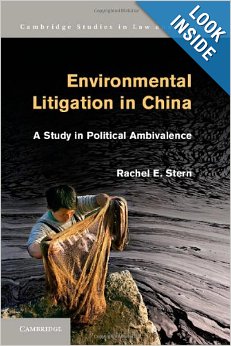Rachel Stern is Assistant Professor of Law and Political Science at U.C. Berkeley, focusing on law, social activism, and environmental issues in China and Hong Kong. This spring, her first book, Environmental Litigation in China: A Study in Political Ambivalence, was published by Cambridge Studies in Law and Society. CDT’s Mengyu Dong spoke to Professor Stern about the book and the increasing use of courts to protect China’s environment:
China Digital Times: You mentioned in your book that you started the research in 2005. So how did you come across environmental issues in China?
Rachel Stern: I’ve been interested in Chinese environmental issues for longer than that. In 2001, I started to work for Civic Exchange, an NGO in Hong Kong. For a year, I did research on cross-border air pollution in Hong Kong. It came to me that any real solutions to Hong Kong air pollution have to involve China. So I have been interested in environmental issues in China for over a decade now. I started my graduate school with the idea of doing something about environmental issues in China. This book came out of my PhD dissertation.
CDT: What surprised you the most when you conducted your research on environmental litigation in China?
RS: When I talk with people about their experiences in environmental litigation, I heard all kinds of stories about how hard it is for ordinary people to win a lawsuit. It’s hard to get cases accepted by the court and it can be hard for ordinary people to hire and pay for the lawyers. There are obstacles after obstacles. So after listening to what these people have to go through, I am often surprised when things actually went right for the people and when it is possible to get something out of the system. I’m routinely surprised and delighted by some small successes that are possible in the current system.
CDT: What was the biggest obstacle you’ve encountered during the research?RS: I think the biggest obstacle is that there is no central database of judicial decisions. Some basic questions like “what percentage of environmental lawsuits are won by the plaintiffs” are really hard to answer, because you don’t have a complete picture of environmental litigation. In recent years, there have been governmental policies of making these decisions available online. The trend is in that direction, but it’s not there yet.
CDT: You’ve talked with some judges in China. What is their basis to decide which cases to accept and which to turn away?RS: My impression is that the judges are trying to do a good job. Environmental cases in any legal system are relatively rare. So it’s relatively unusual for a Chinese judge to come across one. The first reaction is often: I’ve never handled one of these before. How do I deal with it? How do I do a good job figuring out the causation, for example. Sometimes they need to figure out the question of whether the pollution has caused economic harm, and whether a chemical factory upstream should be held legally responsible for a bunch of dead fish downstream. Frequently it means that they will consult with the appraisal agency, the outside experts, to help them deal with professional questions.
CDT: Are those agencies independent?
RS: All possibilities exist. Some are private, others are affiliated with the government. It’s certainly possible for the agencies to be bought off, but at the same time, some a doing a great job. This is a varying sector without a lot of regulations to ensure that the appraisals are of uniformed and high quality.CDT: You started your work in 2005; most data are from before 2010. Is there anything new happening with environmental litigation?
RS: As this book was going to press, the civil procedure law was amended. It made possible, at least on paper, to bring public interest environmental lawsuits. It’s now possible for the NGOs (in Chinese they call them “relevant social organizations”) to bring environmental lawsuits. Before that, only direct victims could bring up environmental lawsuits. That is a huge change from what it was when I was doing research. However, the question is often how the law on the books is going to be interpreted in practice. Last year, Friends of Nature brought a lawsuit in Qujing, Yunnan. I think that was one of the first lawsuits brought by a Chinese domestic NGO. So there are experiments in this area. NGOs have become much more interested in the possibility of using litigation as a tool than they were 6 years ago.
CDT: What do you think is the relationship between environmental problems and the legitimacy of the Chinese government?
RS: I think the Chinese government is increasingly concerned about environmental issues, especially the top leadership, because air pollution and water pollution may be potential seeds for social unrest. And energy security is another reason. If you put all those different causes together, they add up to a real concern about legitimacy. The government sees that part of its legitimacy rests on economic growth and safe living environment for citizens.
CDT: Do you think Chinese readers would be interested in your work? Will you have the book translated into Chinese at some point?RS: I wrote this book mainly for a Western audience, trying to give English-speaking readers an introduction to some biggest issues of our time: what’s happening with environmental problems in China, and what some potential solutions might be. Also I certainly hope that a Chinese audience is also interested in this book.
CDT: What’s your next project?
RS: I’m working on something very different. Mu current project is about international law firms in China. This topic is also very little-written in English. Our starting point is the history of those firms and I hope it will build up to something.
See also a longer interview with Stern on China Law and Policy blog, as well as a discussion relating to her academic work on Seeing Red in China.







